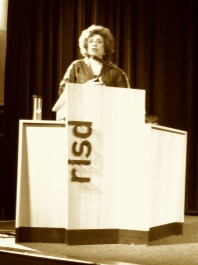PROVIDENCE, RI – Click on the image above to hear a short podcast with Dr. Angela Davis. It is from a brief interview I conducted with her after a keynote address she gave on Monday, June 23, 2012 at Rhode Island School of Design. More information about her talk is below; in the podcast/interview, I ask Davis more about the history of race relations within the labor movement. She replied with an abbreviated timeline of when and why Blacks were excluded, but went on to discuss the benefits of integration in the Labor movement, citing one group in particular – the International Longshore and Warehouse Union (the ILWU). A labor union that primarily represents workers on the West Coast, the ILWU accepted Black workers as members as early as the 1930′s.
Later in the century, explained Davis, Black workers within the ILWU helped introduce new “radical” ideas into the labor union movement, including during the global campaign to dismantle Apartheid South Africa.
The podcast is produced by me Reza Clifton (Reza Rites / Venus Sings / DJ Reza Wreckage). Music by (and played with permission from) The Blest Energy Band ft. Tem Blessed & The Empress. The song, “The Struggle,” comes from their album ”Re-Energized,” which was released January 20, 2012. The podcast and article written below are also available on www.IsisStorm.com.
***
(PROVIDENCE, RI) – Imagination, collective struggle, and the inclusion of ordinary and disenfranchised people. These were among the themes and lessons shared on Monday, January 23, 2012, when famed scholar, activist, and former prisoner (acquitted of charges including murder, kidnapping, and conspiracy), Dr. Angela Davis, spoke at RI School of Design. Part of a week of service dedicated to Reverend Dr. Martin Luther King, Jr., Davis’ keynote address covered the topic of “Building Communities of Activism.”
Her talk included a discussion of King’s belief in collective action despite the memorializing of him as the face of the Civil Rights Movement; an examination of the New Deal from the perspective of the protests and direct actions that prompted the policies that emerged after the 1930′s era Depression; and an analysis of the “prison abolition movement” as an important part of the worldwide struggle for social justice, workers rights, and economic equality.
Davis also talked about and periodically referenced the Occupy (Wall Street) Movement throughout her talk, including the site here in Providence. At times, she was thoughtfully critical about what many have documented as the movement’s absence or sparsity of space for discussions about race, class, and the “intersectionality” of these and other issues in the Occupy encampments, as well as concerns associating the US occupy movements with traditional American occupation narratives of Native lands, Puerto Rico, Iraq, and other sites associated with the rise (and ills) of “global capitalism.” Davis displayed this same kind of caring admonition in reference to the exclusion of prison labor union issues in spaces created by the “free union movement,” expressing pride in the advancements but honesty in the historical tendency to leave certain groups out (ie. women, people of color, and prisoners).
Overall, though, Davis expressed an unbridled show of support and enthusiasm for Occupy activities (and the labor movement), citing Occupy as the main reason why a climate exists again in this country for discussions on economic inequalities and the failures of capitalism. Notably, she also inserted occupy in her speech, reframing the syntax and lexicons usually used in historical texts about Civil Rights and Worker movements, where terms and phrases like “sit-ins” and “street demonstrations” became sites or examples of people who “occupied” spaces.
Conscious of her audience and the origins of the invitation – RISD, an art school – and in response to a question from a student, Davis encouraged artists to continue making their art. Harkening back to the ordinary people who joined because of their collective abilities to imagine a world without segregation, racism, jails, etc. Davis says that artists are in the practice of imagining the impossible, and that alone is a gift to the world – and contribution to the movement.


Deprecated: Function get_magic_quotes_gpc() is deprecated in /hermes/bosnacweb08/bosnacweb08bf/b1577/ipg.rifuturecom/RIFutureNew/wp-includes/formatting.php on line 4387
Deprecated: Function get_magic_quotes_gpc() is deprecated in /hermes/bosnacweb08/bosnacweb08bf/b1577/ipg.rifuturecom/RIFutureNew/wp-includes/formatting.php on line 4387
Deprecated: Function get_magic_quotes_gpc() is deprecated in /hermes/bosnacweb08/bosnacweb08bf/b1577/ipg.rifuturecom/RIFutureNew/wp-includes/formatting.php on line 4387